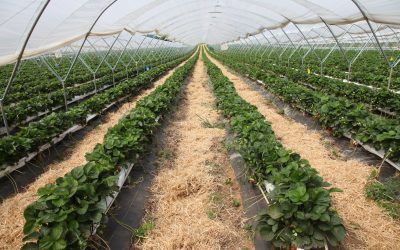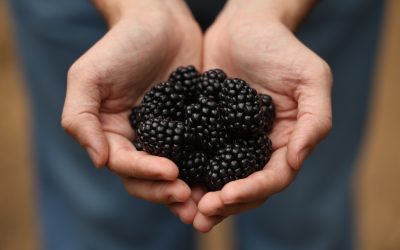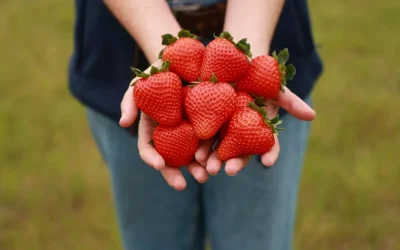New grower audit reveals underlying fears despite strong 2025 crop An audit conducted among more than 40 of Britain’s leading berry growers shows an industry at a crossroads with some reporting improving confidence while others share increased pessimism. ...
Latest News
Please find below all of the latest news from British Berry Growers.
If you would like more information, please contact Sunny Side Up Comms on 07966 521779 or britishberrygrowers@sunnysideupcomms.co.uk
British Berry Growers reveal major sustainability advances in landmark 2025 report
London, UK: 16 September 2025: British Berry Growers (BBG), the organisation representing 95% of the UK’s commercial soft fruit growers, has today published its Sustainability Report 2025, showcasing how the industry is leading the way in sustainable farming...
Blackberries enjoy ‘superfood’ status as British growers praise this season’s flavour and form over their tart, thorny hedgerow counterparts
British blackberry season is underway and thriving, as UK growers encourage consumers to consider the ‘unsung heroes’ of the berry world more often, with the category showing huge growth potential. British Berry Growers, the industry body representing 95% of British...
British Berry Growers urges the government to support increased fruit and vegetable growth across the UK
British Berry Growers, together with the NFU (National Farmers' Union), have co-signed a letter to the Secretary of State, Rt Hon Steve Reed MP, urging the government to support increased fruit and vegetable growth across the UK, a crucial step in addressing the...
Nick Marston, Chairman of British Berry Growers, shared some clear and timely insights at Fruit Focus last week
We see ongoing domestic market growth driven by consumers moving away, at scale, from UPFs (like sweetened breakfast cereals and sticky sugary cereal bars) in to fresh, healthy fruit. This won’t change – it’s not a fad or a fashion. The British climate means we are...
Write to your MP today to encourage their support for healthier school breakfasts
Every child deserves to start the day nourished, focused, and ready to learn. That’s why we’ve launched the National Children’s Breakfast Charter. This is about more than food - it’s about giving every child a strong start to their day. A recent survey commissioned by...
British Berry Growers launches National Children’s Breakfast Charter as research reveals parents do not believe the government is doing enough to support healthy eating choices
Parents are concerned about the quality of their children’s school breakfasts saying that they often fall short of providing the essential nutrients needed for a healthy and productive start to the day, according to new research. Despite 78% of parents admitting...
British strawberries ‘shapely and sweeter’ this season following spring weather, according to British Berry Growers
British strawberries are set to be sweeter and more shapely this season owing to unusually high sunshine levels1, which are the highest recorded in over 100 years according to the Met Office. This spring has also seen exceptional pollination activity during March and...
British Berry Growers Fair dealings position
We are in favour of the proposed Horticulture Sector Regulation, as we strongly believe that the current GSCOP framework does not adequately address the range of issues we are facing. A key advantage of the proposed regulation is its ability to apply across the entire...
British Berry Growers calls on government and retailers to step up
British Berry Growers (BBG), the industry association for the growers of 95% of UK berry production, says the industry is facing ‘very real headwinds’. Launching a new in-depth industry analysis and report by EY, The British berry industry in focus, the association’s...
British berries support with ‘dopamine dining’ as vitamin-packed mood-boosting breakfasts help battle winter blues
As the winter nights continue to bite and the flurry of winter illnesses shows no sign of slowing, people are looking for mood-boosting foods to help pack their plates with a healthy hit. Fresh berries , including strawberries, raspberries, blueberries, and...
British berry industry future under threat – despite UK sector hitting record milestones
British berry growers have warned of a tough year ahead as rising energy costs and wage increases continue to create challenging circumstances for fruit farmers in 2025. 85 percent of British growers previously recorded declines or a stagnation in revenue over a...
British Berry Growers Position Statement on SEDEX – SMETA Audit Standards
Background
BBG members make up the biggest crop group in UK horticulture, accounting for circa 30,000 of the Seasonal Workers’ Scheme (SWS) visas. Workers are generally based on one location for the period of employment in the UK – which is different to other short season crops within UK horticulture.
Berry industry being squeezed: Rising costs and retail pressures could put 40 percent of growers at risk of going out of business by 2026.
Despite resilience in the face of tough market conditions, berry growers have increasing concerns over the future of their industry, with nearly half of growers no longer profitable.
Co-op Named Retailer of the Year at Annual British Berry Growers Event
Co-op has been crowned retailer of the year by British Berry Growers at the crop association’s yearly retailer event in London.
British Berry Growers Say Supermarket Relationships Are No Longer a Partnership, as Two-Thirds Admit They Are Less Confident About the Future
Amidst the huge consumer demand for British berries there is concern over the industry’s viability with spiralling production costs and low retailer returns
Grower Techniques Ensure Availability of Blackberries Through to November, Well Beyond Hedgerow Season
- Advanced grower techniques lead to blackberries that are larger and sweeter than their hedgerow counterparts
-
British shop-bought blackberries are larger and sweeter than hedgerow varieties.
-
Grower techniques ensure that British blackberries are available from April until November, enjoying a 36-week season.
-
The berry industry is now worth £1.7 billion in retail sales year-round1 and is estimated to contribute £3.18 billion to the UK economy in the next five years.2
Busy Bumblebees Ensure Bumper British Blueberry Crop Despite the Wettest July in Over a Decade
-
Pollination plans have helped create a robust British blueberry crop this year that has withstood the unseasonal weather.
-
Peak production is now underway (w/c 21 August).
-
The berry industry is now worth £1.7 billion in retail sales year-round1 and is estimated to contribute £3.18 billion to the UK economy in the next five years.2
It’s British Berry Season, but Which Retailers Are the Best at Backing British?
-
Lidl tops the chart of major retailers as the most supportive of British berries, followed by Co-op, Aldi and Waitrose.
-
Asda is bottom of the list, just below Sainsbury’s, Iceland and Tesco – all buying significantly fewer British berries compared to their total grocery market shares.
Eight Percent Drop in Strawberry Plants for 2024 Signals Urgent Need for Fairer Returns for Growers
- An estimated 18 million fewer strawberry punnets could be on supermarket shelves in 2024.
- The decline is a result of the rising cost of production and flat returns to growers from UK supermarkets.
- If production continues to drop at this rate, the British berry industry may halve by 2031.
Bumper Raspberry Season Arrives After Hottest June Delays Start of Season
- A break in hot weather brings the arrival of bigger and juicier raspberries
-
Peak British raspberry season begins this week and will continue throughout July.
-
Unlike strawberries – which like sunny, clear skies – raspberries thrive under partial cloud cover.
-
Modern varieties and growing techniques mean that Brits will be able to enjoy great quality British raspberries through to December, weather permitting.
-
The berry industry is now worth £1.7 billion in retail sales year-round1 and is estimated to contribute £3.18 billion to the UK economy in the next five years.2
Strawberries Will Be Bigger, Juicier and Sweeter Than Previous Years Following Cool Spring and Recent Warm Weather
A cooler than average April and May means that the nation can expect to enjoy bigger and juicier strawberries than previous years due to a slower ripening period.
British raspberries set to be bigger and sweeter this year thanks to a warmer spring
Last year Brits bought over 12,500 tonnes of British-grown raspberries
Brighter weather means sweeter strawberries and 50% more than this time last year
The iconic British fruit will be filling supermarket shelves in mid-May compared to June last year.
Brits ditch prudish mentality on sexual wellness
41% of Brits have become more open to talking about sex in the last decade.
- Behavioural Psychologist Jo Hemmings and Nutritionist Dr Emma Derbyshire back the campaign by industry body British Berry Growers as The British Urology Foundation praise its research findings.
- Over half agree conversations on sex can help reduce taboo around sexual health.
- Just 12% try foods to boost sexual wellness; with five in six unaware blueberries may benefit.
- ‘Luberry’, a free limited-edition blueberry flavoured lube, has been launched as part of the campaign to raise awareness of the links between food and sexual wellness.
The implications of increases to seasonal worker rates of pay in 2020
For soft fruit production – principally strawberries, raspberries, blackberries and blueberries – labour is the most significant cost, typically representing 40-60% of all expenditure.
The Potential Implications of Covid-19 for the Costs of Production of UK Fruit & Vegetables in 2020
The National Farmers Union, the British Growers Association, British Berry Growers and British Apples and Pears have jointly instructed John Pelham of Andersons Midlands to prepare a report on the potential implications of Covid-19 for UK fruit and vegetable growers’ costs of production in 2020.
The Impact of Brexit on the UK Soft Fruit Industry
The Anderson Report.


























